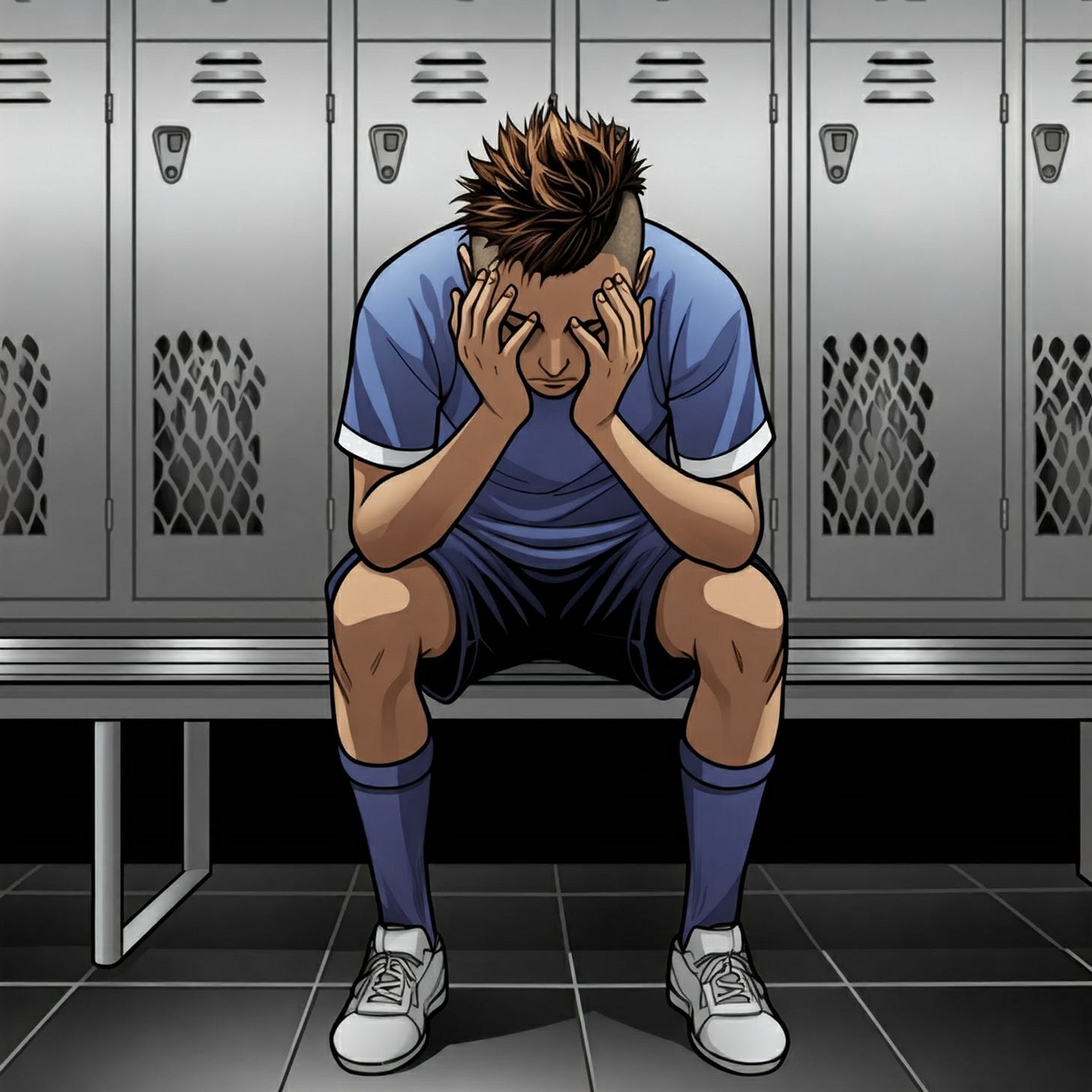Are Youth Sports Failing Our Kids?
Our October Newsletter!
What We’re Discussing In This Issue
The Opening Line From Jim and Jason.
A Mental Health Message from Dr. Alex Auerbach
Spotlight: World Mental Health Day
The Reality Check: Beyond the Scoreboard, Into the Heart of the Matter
The Deep Dive: Understanding the Struggle
The Toolbox: Building a Culture of Mental Wellness
Game-Changing Quote: Elevate Your Coaching with this Week's Wisdom
Champions of Change: The Comeback That Defined Us
The Joy of the Game: Keeping the Fun Alive
The Opening Line From Jim and Jason
This past October 10th was World Mental Health Day, a powerful reminder that true strength goes beyond the scoreboard. It's about nurturing the whole athlete - physically, mentally, emotionally and spiritually.
We know the pressure to perform is real. We see it in the tired eyes of our athletes, hear it in their doubts, and feel it in the weight of expectations. But it's time to shift the game.
Let's create a space where vulnerability is seen as strength, where struggles are met with support, and where every athlete knows their worth extends far beyond wins and losses. This newsletter is filled with practical tools to help you build that kind of environment – a place where athletes not only compete but truly thrive.
Let's empower our athletes to flourish, not just in sports but more importantly in life.
Join the movement!
Jason and Jim
Ready to change the game? Let's do this together.
Not your thing? No hard feelings. Click unsubscribe at the bottom of the newsletter.
With unwavering support,
Jim & Jason
A Mental Health Message from Dr. Alex Auerbach
We're excited to share this insightful piece from Dr. Alex Auerbach, founder of Momentum Labs and former Director of Player Development for the Toronto Raptors. Dr. Auerbach is a leading expert in sports psychology and a trusted colleague to 4D Leaders. He brings a wealth of knowledge and experience to this critical conversation about mental health in youth sports. See below from Dr. Auerbach!
MENTAL HEALTH IS HEALTH from Dr. Auerbach
It's time to change the way we talk about our mental health and mindset. This World Mental Health Day, I want to encourage you to view your mental health just like your physical health. It's something to nurture, take care of, and even optimize. The healthier your mind, the better you perform.
Athletes at every level right now are inundated with pressure. Pressure to perform better, earn more, please family and friends, and in some instances, even more. All this pressure can take a toll on their mental health, but it doesn't have to. It's time to invest in taking care of your mind so you can consistently be your best when it matters most.
Your athletes will think, feel, and perform better with their well-being solidified. Let's work together to create a culture where coaches and athletes alike are encouraged to take care of themselves, to reach out for help, and to maximize their mindset the way they maximize physical training.
The healthier athletes we have, the better the ecosystem becomes. The better the ecosystem, the more everyone - parents, coaches, and athletes - can thrive.
Alex Auerbach Ph.D., MBA
Performance Psychologist
Dr. Auerbach's message is clear: prioritize mental health. A strong mind fuels a strong athlete. Let's build a culture where athletes thrive both in and out of sports.
Be sure to click here to check out our podcast episode where Dr. Alex Auerbach was a guest on our show and shares how we can face these issues and build strong mental health and teamwork in youth sports!
Spotlight: World Mental Health Day

We all know those electrifying moments that make youth sports so special. But amidst the cheers, it's easy to overlook the quieter struggles happening beneath the surface. The player who suddenly withdraws, the star athlete whose performance inexplicably drops – these are signs that something deeper might be going on.
It's easy to get caught up in the wins and losses, but as coaches, we need to see the whole athlete. We need to recognize when they're hurting, even when they try to hide it.
This October, as we celebrated World Mental Health Day, let's pledge to be more than just coaches. Let's be the trusted adults who listen without judgment, who create a safe harbor for our athletes to share their struggles and prioritize their well-being. Because beneath those jerseys and game faces are young hearts and minds that need our support to truly thrive. Let's build a culture where it's not only okay to not be okay, it's encouraged.
The Reality Check
There's a crisis in youth sports, and it's not just about wins and losses. Katie Meyer, a star goalkeeper for Stanford University, seemed to have it all – athletic success, academic achievement, a bright future ahead. But beneath the surface, she was battling a darkness that ultimately led to her taking her own life.
Katie's story is a tragic reminder that even the most talented, successful athletes can be struggling with their mental health. We can't assume that a winning smile hides inner turmoil. We need to pay attention to the signs: the withdrawn player, the sudden drop in performance, the emotional outbursts. These can be cries for help.
And the numbers are alarming:
25% of high school athletes experience suicidal thoughts.
Mental health concerns among college athletes doubled from 2013 to 2018.
1 in 7 U.S. kids and teens has a mental health condition, and half go untreated.
These are the young people we coach every day. We need to acknowledge this crisis and make their mental well-being a priority.
So, how did we get here? Is it the pressure? Social media? The win-at-all-costs mentality? Let's explore the root causes and create a healthier environment for our athletes.
The Deep Dive: Understanding the Struggle
We've acknowledged the prevalence of mental health struggles in youth sports. Now, let's delve deeper into the underlying factors that contribute to this silent epidemic. By understanding the root causes, we can develop targeted strategies for prevention and support.
1. The Pressure Cooker of Performance
The Win-at-All-Costs Culture: In many youth sports environments, the relentless pursuit of victory can overshadow the importance of individual well-being. Athletes may feel pressured to prioritize performance over their mental and emotional health, leading to chronic stress, anxiety, and burnout.
Unrealistic Expectations: The constant drive to be the best, to achieve perfection, can create an overwhelming sense of pressure. Young athletes may internalize these expectations, leading to self-doubt, fear of failure, and a diminished sense of self-worth.
The Comparison Trap: Social media, with its highlight reels and curated portrayals of success, can fuel unhealthy comparisons and feelings of inadequacy. Athletes may feel pressure to live up to unrealistic standards, leading to anxiety and a distorted sense of self.
2. The Developmental Tightrope
Adolescence Itself: The teenage years are a time of immense physical, emotional, and social change. Add in the demands of competitive sports, and it's no wonder many young athletes struggle to cope with the pressure. Their brains are still developing, making them more vulnerable to the long-term effects of stress.
Identity Formation: For many young athletes, their sport becomes a central part of their identity. While this can be positive, it can also lead to challenges if their sense of self becomes solely dependent on athletic performance. Setbacks and injuries can be particularly devastating, leading to feelings of loss and confusion.
Social and Academic Pressures: Balancing the demands of school, social life, and a rigorous training schedule can be overwhelming. Many athletes feel pressure to excel in all areas, leading to chronic stress and a lack of time for self-care and relaxation.
3. The Lack of Positive Support
Parental Pressure: While most parents have good intentions, their desire for their child to succeed can sometimes create undue pressure. Unrealistic expectations, excessive criticism, or a focus solely on results can contribute to anxiety and a fear of failure in young athletes.
Coaching Styles: A coach's approach can significantly impact an athlete's mental well-being. Coaches who prioritize winning at all costs, use harsh criticism, or fail to create a supportive environment can contribute to stress and anxiety.
Team Dynamics: The relationships athletes have with their teammates can also influence their mental health. Negative team dynamics, such as bullying, cliques, or a lack of support, can lead to feelings of isolation and low self-esteem.
Turning the Tide: A Call to Action
By understanding these complex factors, we can develop targeted strategies to support our athletes' mental well-being. Let's create a sporting culture that prioritizes the whole athlete, fosters open communication, and promotes healthy coping mechanisms. Let's empower our young athletes to not just play the game, but to thrive in all aspects of life.
The Toolbox: Building a Culture of Mental Wellness
We dove into the harsh reality of mental health challenges in youth sports. Now, let's arm ourselves with practical strategies to foster a culture of well-being and resilience.
1. Communication is Key
Open the Door: Don't just say "my door is always open." Schedule regular check-ins with your athletes, individually and as a group. Start each season with a team meeting dedicated to mental health, where you set the expectation that it's okay to talk about struggles.
Normalize the Conversation: Weave mental health into your everyday coaching. Just like you emphasize proper nutrition and rest, talk about stress management and emotional well-being. Share stories of athletes who've overcome challenges.
Listen Actively: When an athlete opens up, be present. Put your phone away, make eye contact, and reflect back what you hear. Say things like, "It sounds like you're feeling overwhelmed by..." to show you're truly listening.
Click here to check out this quick and easy guide you can give parents to support their athlete’s mental health. Copy and paste the document then personalize it for your program.
2. Empower Your Athletes
Focus on the Process: Instead of just praising the top scorer, acknowledge the player who hustled for every loose ball. Create a "most improved" award. Celebrate small victories and personal bests.
Teach Coping Skills: Introduce simple mindfulness exercises during practice breaks. Teach them how to use deep breathing to calm their nerves before a big game. Share resources like apps or websites that offer guided meditations and relaxation techniques.
Build a Team Culture: Organize team-building activities that foster connection and trust. Encourage athletes to support each other, both in and out of sports. Create a culture of positive communication and celebrate individual achievements.
3. Teamwork Makes the Dream Work
Parent Power-Up: Host a pre-season parent meeting dedicated to mental wellness. Share information about the signs and symptoms of mental health challenges, and provide resources for parents to support their athletes.
Pro Tip: Use this sample agenda to get your parent meeting started
Expert Allies: Invite a mental health professional to speak to your team. Keep a list of local resources readily available for athletes and parents.
Walk the Talk: Prioritize your mental health. Take breaks, practice self-care, and be open about your challenges. Model healthy behaviors for your athletes.
4. Build Deeper Relationships:
Show genuine interest in your athletes as individuals. Ask them about their hobbies, their families, their dreams for the future.
Use these questions to spark meaningful conversations:
What's something you need right now from me as your coach?
Who would you love to meet?
What are you passionate about outside of sports?
Who is your biggest supporter?
What else are you interested in?
Together, let's create a valuable experience for our athletes, both in life and sports.
Game-Changing Quote: Elevate Your Coaching with this Week's Wisdom
"The strength of the team is each individual member. The strength of each member is the team." - Phil Jackson'
Why It Hits Home:
This quote highlights the power of individual strengths within a supportive team. When athletes feel valued and safe, they can face challenges with the strength of the entire team behind them. That's where true resilience comes from – knowing you're not alone in the game of life.
Champions of Change: The Comeback That Defined Us
The roar of the crowd was deafening as my team took the court. We were known for our heart, our hustle, and our unwavering belief in each other. But in that game, our belief was being put to the test. The scoreboard painted a grim picture: a 21-point deficit with time slipping away. Doubt crept into my players' eyes, their usual confidence shaken.
This was more than just a game. It was a chance to prove that belief in themselves, in each other, could overcome any obstacle. "Look around," I urged them. "See the talent in this huddle. See the heart. We haven't come this far to give up now."
And they didn't. They dug deep, reminding themselves of the power they held within. One steal, one layup, one defensive stop at a time, they chipped away at the lead. The energy shifted, the crowd erupted, and with seconds left, our sharpshooter drained the game-winner.
That day, the scoreboard read 43-41, but the real victory was far greater. It was a testament to their unwavering belief in themselves and their teammates, a belief that fueled their comeback and etched a lasting lesson in their hearts. They learned that night that true strength comes not just from within, but from the unwavering support of those around you.
As a coach, it is not only our job but our obligation to show kids not only to believe in themselves but also to believe in those around them.
The Joy of the Game: Keeping the Fun Alive
A friendly reminder of how we can keep sports fun, make a difference, and laugh with each other along the way!







